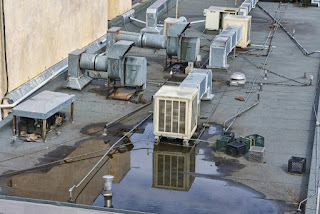HOW TO TAKE PROPER CARE OF YOUR RTU HVAC SYSTEM
A packaged rooftop unit, called an RTU, is an HVAC system installed on the rooftop of a building. Many commercial buildings with flat roofs opt for RTUs because they don’t take up valuable space inside the building and are out of the way when they’re on the rooftop. They’re also can be very energy efficient and cheaper to run than other HVAC systems.
RTUs are often described as an HVAC system in a box, because all the heating and cooling components are packaged together into one unit, making it easier to set up, access, and maintain. As with other types of HVAC units, RTUs need regular maintenance to keep them running efficiently and safely to maximize their lifespan.
Why Regular RTU Maintenance Matters
Neglected RTUs can result in expensive problems that disrupt your business. An RTU breakdown is especially inconvenient during the summer or winter, when heating and cooling is essential. Regular RTU maintenance can find and prevent a range of problems, including:
- Leaks. The type of leaks any HVAC system could have are air leaking out of duct work, refrigerant leaks or condensate water leaks. When these leaks occur in your HVAC system, it causes the system to become inefficient. If you suspect your RTU has leaks, please contact an HVAC maintenance team who can inspect and repair it before it enlarges.
- Dust build-up. If you’ve ever changed an air filter in a traditional HVAC system, then you’ve seen how much dust builds up over the course of a few months – both in the filter and on the fan. RTUs are no exception, and dust build-up and other debris can negatively impact performance and efficiency.
- Water damage. Because RTUs are exposed to the elements, they’re more susceptible to water damage than indoor HVAC units.
- Obstructions or clogs. HVAC vents occasionally become clogged and obstructions will interfere with performance quality.
A typical maintenance check-up should include the following
- Inspecting the air filter. Your air filters are what deliver clean air into your building, so it’s essential that they are changed regularly. We recommend investing in the highest quality air filters to purify your air.
- Cleaning the internal fan and the motor. Because RTUs are exposed to the weather, the fan blades can become rusty faster than the fan in a traditional HVAC system. You’ll also need to clean dust and other debris from the fan and the motor.
- Heat exchanger inspection. The heat exchanger heats the air; it’s a complex system of tubes and it’s important that it remains in proper working condition.
- Cleaning the coils. Flush out dust buildup that can slow your RTU down and affect its efficiency.
- Cleaning the drainage system. Water and coolant must be able to flow freely through the drainage system, so regularly cleaning out the drainage system is important.
- Electrical components. Have the motor starters (contactors) and all of wiring checked for wear.
- Replacing the drive belt. We recommend replacing your RTU’s drive belt once a year because they easily get worn down with everyday wear and tear.
Don’t Take Shortcuts with Your RTU HVAC System
Your building is made up of many systems that require regular inspection and maintenance, like electrical and plumbing. While many people don’t call an HVAC repair person until something goes wrong, it’s in your best interest to invest in a regular maintenance program to keep everything in top working condition. Waiting until there’s a problem often means costly repair work and major disruptions.
If you’d like more information about keeping your rooftop unit in its best condition, or if you need someone to conduct routine maintenance on your rooftop unit, please contact our team at Tri-Tech Energy today. Discover why so many people call us for RTU maintenance in NJ.
Original article posted here - https://www.tritechenergy.com/blog/commercial-hvac-repair/how-to-take-proper-care-of-your-rtu-hvac-system/



Comments
Post a Comment